Trina Alejandra Q. Firmalo-Fabic
Last September 03 to 15, 2017, I participated in the seminar on “Local Politics and Citizens’ Participation” held mainly at the International Academy of Leadership, Gummersbach, Germany, with learning trips to nearby cities/districts such as Cologne, Monheim, Coesfeld, Munster, and Hamm. There were participants from 23 countries from a variety of backgrounds: government, political parties, NGOs, civil society groups, and the academe. The Friedrich Naumann Foundation (FNF) sponsored my participation in the said seminar.
I came out of the seminar with deepened understanding of important concepts and an appreciation of the importance of citizens’ participation in politics and governance. I was inspired to put into practice some of the things I learned about which I felt could be applicable to my municipality.

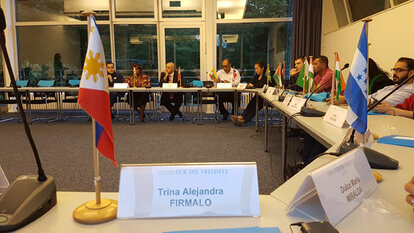
Herewith are my main insights and learnings, many of which I believe are relevant for my work and for the Philippines:
On Liberal Values
I was able to gain more insight into liberalism and liberal values from the seminar. Participants discussed ideas and issues related to liberal values such as: freedom, free trade, market economy, neoliberalism, globalization, private property, transparency, enlightenment, education, community, justice, equality, solidarity, tolerance, government, state, secularism, decentralization, freedom of expression, competition, opportunity, subsidiarity, rule of law, truth, reason, diversity, choice, and responsibility. Sometimes, some of these liberal values may clash with one another. As a member of the Liberal Party of the Philippines, I appreciated the session; I believe that members in my country can benefit from an ideological orientation/deepening that can enhance their affinity with the Party.
We also gained insight into the workings and strategies of the Liberal Party of Germany (FDP). It was interesting how for the 2017 elections, they employed an advertising firm to help them with the campaign. They also changed colors and their logo, and opened the party to new membership. They also have a group called the Young Liberals catering to the politically active youth. As with political parties in other countries, they also placed premium on interactions with the voters and used strategically located booths and other methods to gain voters’ attention and to be able to reach out to them. They realized it was important to create an emotional connection with voters. Training campaign workers is also important to make sure they really know the platform. contributions to political parties are tax-deductible up to a particular amount in Germany.
The political party structure is separate, wherein there is a parliamentary group, and a group of non-elected members. There is a party convention where members (both elected officials and non-elected citizens) can bring up opinions on policies. Having members who are ordinary citizens is something that can be implemented in the Philippines that could strengthen the party system by encouraging membership based on advocacy, policy and ideology instead of political convenience.
In Germany, legislative committees have representatives on each committee from the different political parties. This would be something that the Philippines could implement to have a more representative democratic process.
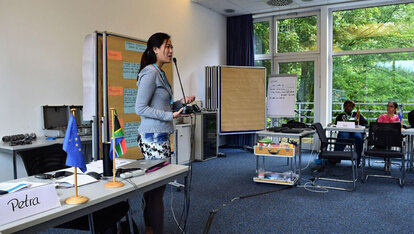
On Local Government Politics and Policies
We looked at local government politics and assessed competences, tasks and challenges. From the sessions and from interactions with my fellow participants, I felt that our political systems may be different, but the problems of governance across countries are quite similar (perhaps only varying to the degree of the problem). Particularly: the need for more decentralization, too much bureaucracy, inefficiency, corruption, lack of transparency and accountability.
We learned about the German political system / government set-up with a federal parliamentary representative democratic republic.
We had a discussion on the inclusion at school of disabled children. There is a distinction made between physically disabled and mentally disabled children, with the state catering to the physically disabled children. I appreciated their motto for persons with disabilities (PWDs): “as much independence as possible, as much support as necessary”. The government in Northern Westphalia had a law wherein companies pay a fee if they are not able to hire PWDs as employees (if 50 employees – 1 PWD employee; if 100 – 2 PWD emps, etc.), with the ideal ratio being 5% of employees. There are also incentives if you have more than the quota. This is something that the Philippines can consider legislating in order to promote employment opportunities for
PWDs. However, this must be thought out well given that our cities are not as PWD-friendly in terms of transport and other facilities for those who would seek employment.
One of our speakers talked about reward systems, performance-related pay, and a mutual rating system. But she stressed the need to establish a clear internal dialogue, and the need to be careful because implementing something like this is a change process and needs values formation. In change management, she said that it is preferable that all should be on your side when implementing.
We learned about best practices, achievements, and innovations that were undertaken in other countries, such as the implementation of regulation/law on environment and public easement in Krabbi, Thailand, preparing 5-year strategic plans in Turkey through participatory processes involving civil society, NGOs, chambers of commerce, professional units, tapping CSOs in Zimbabwe to provide utilities and services that the public sector was unable to take care of, using policies on access to information and transparency to decrease corruption in Lebanon, involving transgenders to improve local tax collection and raise awareness about HIV/AIDS in India, automatically allocating 10% of a project’s budget for monitoring and evaluation in Moldova, and others.
We met the Mayor of Monheim, who talked about the lowering of trade tax to increase competitiveness and the ability to attract investors. He also talked about how the city allocated land for 2 mosque associations for free to build mosques. Other ideas which were interesting were: having a youth club, car-free Sundays, regular/scheduled citizens’ forum open to all who were interested, social activities for young people, 1-hour free parking in the city, and having a smart health center where you could be remotely connected to specialists (which is something we are trying to do in our province). From the discussion I had the idea to come up with a handout/brochure on the Building Code for those applying for building permits.
We met elected representatives from Coesfeld district, who talked about challenges and opportunities in rural districts such as theirs, which they try to keep as attractive as possible. Among the advantages of their district, which they highlight, include low-priced land, road infrastructure, work-life balance, and local entrepreneurs. They are trying to further develop high-speed internet infrastructure and quality healthcare services. Coming from a rural area, I could relate and gained insight into possible strategies to attract investment and residents.
Citizens’ participation enables and empowers citizens to help themselves.
It is important to have a Citizens’ Affairs Desk. Transactions can be given tracking numbers for easier monitoring of requests and reports.
I got the idea to establish senior advisory boards and youth advisory boards that can be consulted regarding programs and projects.
We visited an economic development and innovation center in Hamm, where we learned about how centers like this support start-up companies by providing teaching, coaching, and guidance on business models (what do you need to start a company) as well as providing space (co-working space, classical offices). The center had a Living Lab where new applications for businesses could be tested. They also had a program called Start-Up Teens, a competition for start-ups and students, which encouraged youth to come up with viable business ideas. This is a model that can be emulated in the Philippines to provide further support for micro, small and medium enterprises and would-be entrepreneurs.
For the 2019 municipal budget, I decided to try to really incorporate participatory budgeting into the process (which will take place in 2018), by involving youth, women, persons with disabilities, senior citizens, farmers, fisherfolk, the business sector, and other groups into the pre-allocation process of identifying needs/problems and projects that need funding and prioritization.
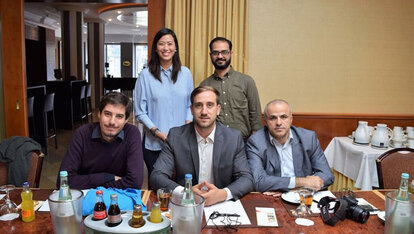
Technology as a Platform for Increased People's Participation
Technology can be used to harness positive effects of citizens’ participation. There are various ways by which online participation in the political process can be institutionalized. We had a speaker discuss the different modes and examples, such as participatory budgeting, noise action planning, contributing to development planning, rezoning of municipal development plans, or complaint mechanisms/service center/defect reports.
Online participation is also utilized for the evaluation of the performance of elected officials. The most important determinant as to whether online participation is successful is if participants feel they are affected or involved in the issue being raised. It is also important to look at the impact of online participation vis-à-vis the cost of transparency. The speaker also presented a new mode of online participation: dialog-based interaction instead of forum (linear list) wherein an argument is displayed, feedback on this is fathered, and the prevailing argument is chosen and highlighted. This was an intriguing new mode that could have potential in making online participation more dynamic.
Another speaker, a professor, discussed the e-government performance of German city administrations and citizens’ online participation. He outlined the different kinds of democracy: representative, direct, deliberative, and demonstrative participation. Similar to the first speaker, he discussed the different venues for citizens’ participation online: E-participatory budgeting, Crowd planning, Social media, Online participation, Crowd monitoring, etc. Crowd monitoring can take the form of electronic complaint management, such as when something is not working. He gave the example of the Fix My Street program in London, which has been instrumental in getting feedback from citizens as to what infrastructure needs to be repaired. According to him, Participatory Budgeting is usually reduced to small things. Citizens are focused more on localized concerns. Different types of participatory budgeting include: information management/electronic suggestion box, surveys, neighborhood funds, and budget simulator. Thus, governments can determine the degree of involvement for citizens online: it can be co-deciding (policy-determining) or co-conduction (giving people a role in a program). The speaker also talked about invented space versus invited space (government-initiated). What usually takes place is a hybrid and blended democracy, where offline and online modes exist together. The challenge is how to make involvement attractive to people. Trust in institutions is a fundamental element for people to engage.
In some countries, there are websites where people can search for procedures related to government services, with these outlined step by step, and needed forms made available. There is also an option to inform the system if the procedure one is looking for is not available on the website. (Is your procedure not here?) Some governments are also implementing legislative tracking, making budgets available online for viewing, and allowing citizens to pay taxes online.
One very good example of a government that has fully gone virtual is Estonia where most services are available online.
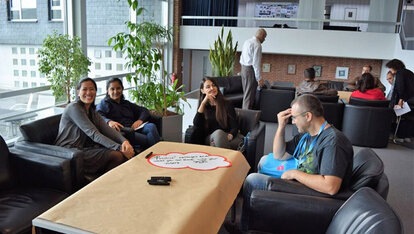
Effective Communication is a Prerequisite for Successful Citizen Involvement
We learned more about effective communication. Among the key points:
- A customer or client needs to hear something at least eight (8) times before they respond to an advertisement or message.
- Messages must be simple and frequent (K.I.S.S. principle).
- Communication is a political tool. The division between political and administrative levels can be blurred
- when communicating on behalf of a municipality.
- Utilize imagery. Use infographics. Tell a story. Tell the right story.
- Use signposts (1,2,3…).
- Have a call to action.
- Tell them what you’re going to say, tell them, then tell them what you’ve told them.
- It is better to tell the bad news yourself. Tell the truth. Avoid “no comment”.
- Put in a lot of time into prepared statements.
- Keep notes; develop a filing system.
- There is no such thing as off-the-record.
- Have an elevator pitch (20-30 seconds persuasive speech to spark interest in your org or product).
- Giving feedback – the hamburger principle – say something positive, then provide critical feedback, then something positive again. (Sandwich the criticism.)
- Golden circle – first establish the WHY before the HOW and WHAT. People don’t buy what you do, they buy WHY you do it.
- Law of diffusion and innovation – We follow those who lead, not for them but for ourselves.
- Look at the seen and unseen.
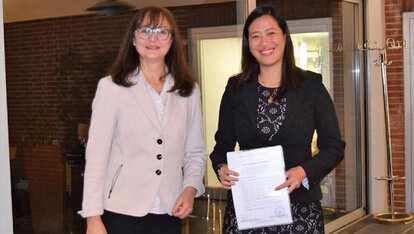
Strategic Planning as a Tool for Improved Local Government Performance
“Only when the individual involves itself in it, can a liberal society grow.” – Friedrich Naumann
“If you fail to plan, you plan to fail.”
This for me was one of the highlights of the seminar: learning in detail how to go about strategic planning. We learned how to craft vision and mission statements, identify issues and problems to be addressed, how to choose what solutions to employ, how to break down activities with a time frame, specifying persons responsible, etc. This is something that I plan to carry out in my organization to clarify goals and objectives, and properly delegate programs and projects.
Strategic Planning: Like a road map - Where do I want to go? Why do I want to go there? Who will go with me? How will I get there? What will I have achieved by getting there?
My group crafted a Strategic Plan for an identified problem, which was the need for traffic management in my municipality. There were things that we discussed that I plan to include in an actual traffic management plan to be carried out in 2018-2019.
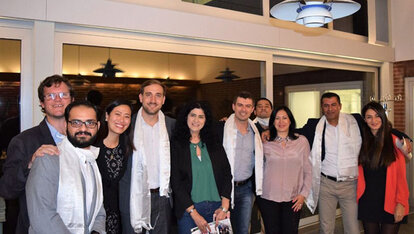
We Must Continually Strive for Improved Quality of Life
I appreciated how smooth transportation was, with the different modes interlinked seamlessly. I also appreciated the green public spaces and facilities that contributed greatly to the quality of life there. In many cities it was easy to bike or walk around – something that we long for in the Philippines. In future infrastructural projects of the municipality, I shall endeavor to incorporate what I’ve learned and seen regarding public spaces and facilities.